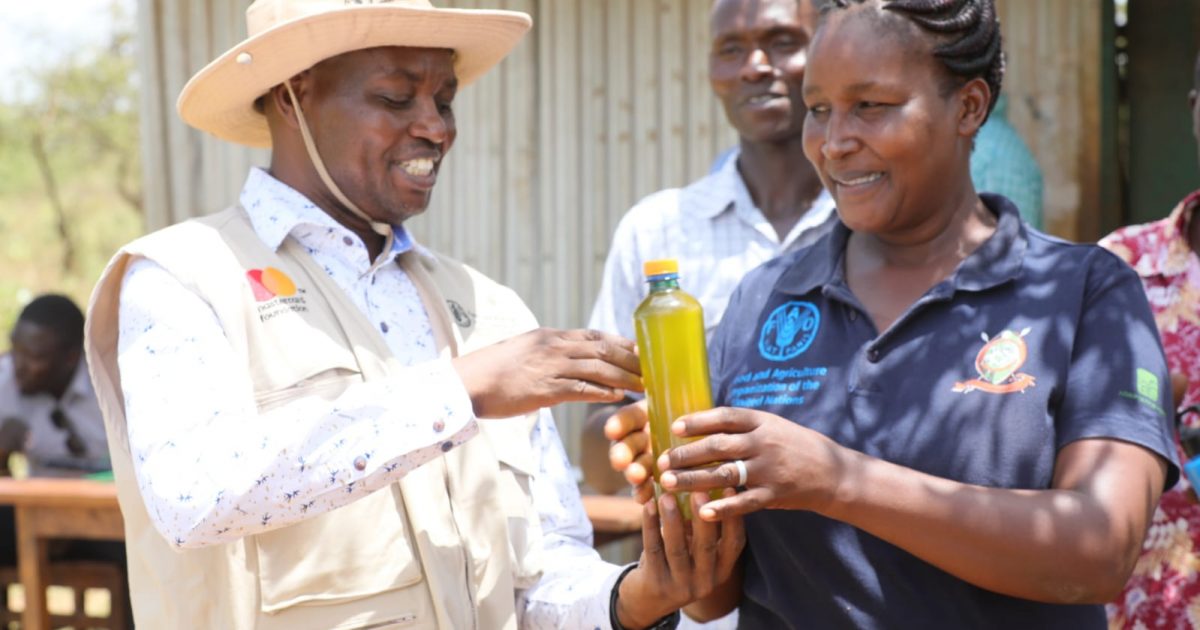Smallholder farmers in Taita Taveta County have been urged to take up oil crop cultivation, whose huge unmet demand guarantees a ready local and international market.
The Taita Taveta County Executive Committee Member for Agriculture, Fisheries and Livestock, Eric Kyongo said although the oil crops are drought resistant and adaptable to many ecological zones, Kenya is currently producing less than 50 percent of her needs.
“Kenyan oil manufacturers are grappling with huge deficits in production of sunflower, canola, soya beans, and linseed. The key players who manufacture edible oils have resorted to importing sunflower and soya beans from other countries like Uganda and Tanzania to meet the high processing demand,” said Kyongo.
Kyongo stated that the County government has earmarked the sunflower value chain to boost local production of edible oils.
“Sunflowers do not need a lot of rain, they don’t require a lot of fertilizer nor do they need a lot of farm inputs, hence suitable for most of our farmers,” he said.
According to the researchers, sunflowers grow well in areas with sparse rainfall, and the soil should be slightly acidic with a pH of between 6.0 and 7.5. Two main categories of sunflower-Hybrid Variety and Open Pollinated Variety (OPV) are grown in the country.
Several hybrid varieties which include Mammoth, Sunbeam, Autumn Beauty, Kenya Fedha and Teddy Bear are grown in different parts of the country and take up to four months to mature.
Hybrid varieties of sunflower are preferred as they have higher oil content and better yields per acre averaging 25 bags, while open-pollinated varieties have the advantage that their seed can be recycled four times.
“We have been contacting willing farmers who grow sunflowers and we assure them of a ready market. We want to boost the supply of the raw material to our processing plant in Mahandakini, Taveta sub-county,” added Kyongo.
According to him, farmers in the county face the problem of mono-cropping that has led to build-up of diseases and pests, resulting in declining productivity and profitability of farms.
He further urged farmers to compare the profitability of sunflower and maize adding that sunflower has proven to be more profitable compared to maize grown in the same acreage of land, hence urging farmers to embark on sunflower cultivation.
He disclosed that the county government is set to distribute about 15 tonnes of sunflower seeds across the county as farmers in Taveta Sub County get four tonnes.
According to him, the seeds are expected to be planted in 1,300 acres of land in Taveta with a projected production of about 700 kilograms per acre, which translates to about 700 tonnes from one harvest.
In partnership with the Food and Agriculture Organization (FAO), the county government of Taita Taveta launched an oil hot press machine stationed at Mahandakini, Taveta sub-county aimed to ease the processing of the product and to promote sunflower farming in the county.
The CECM noted that one litre of processed sunflower oil goes at Sh. 350, adding that from a tonne of the harvest, about 159,000 liters can be produced and subsequently help bridge the gap in the demand of the edible oil.
According to data from the Agriculture and Food Authority (AFA), Kenya’s import bill of edible oils has been increasing at an annual rate of 15 percent due to increasing demand locally.
In order to ensure compliance to standards and health requirements, Kyongo added that the county government will invite relevant departments like Public Health, Kenya Bureau of Standards (KEBS), and KRA to offer education to the farmers and ensure the end product is fit for human consumption.
“As a county, we want to take our farmers to the second step of involving all the relevant bodies to help our farmers attain the required standards for edible oil like public health, KEBS and KRA who will enlighten the farmers on how they can utilize the commodity to raise their living standards,” said Kyongo.
Onesimus Musyoki, a sunflower farmer and a leader of the Mahandakini Farmers’ Cooperative Society said that they are working on ensuring that every sunflower farmer puts at least one acre under sunflower farming in order to reap from the already launched and working machine.
He lauded the county government and FAO and agricultural offices for giving sunflower seeds to farmers and the donation of a hot oil press machine, which he said will not only serve the residents but also sunflower farmers from outside the county.
“We thank the county government, FAO and agricultural offices in Taita Taveta for making sure sunflower farmers have this machine. We have been incurring high costs on transport to go all the way to Tanzania to process our sunflower seeds, but now we are relieved,” added Onesimus.
Apart from sunflower oil, the by-products such as sunflower cake have a high demand and ready market as animal feed and farmers can make more profits as they incorporate value addition in the enterprise as compared to selling the raw seed.
On her part, Jane Muthoki, one of the farmers at Mahandakini said that since she embarked on sunflower farming, she has gained profits compared to when she was venturing into other crops like maize and beans.
She called upon the government to provide the farmers with farm inputs and more machines for processing sunflower for farmers to benefit from the crop.
She also urged the county government to ensure that there are no cartels who will interfere with their produce prices and make their efforts go in vain.
“We are pleading with the county and national government to provide us with farm inputs, and more machines as well as ensuring farmers are regularly trained so as to gain more knowledge on how to handle post-harvest processes to avoid losses,” said Muthoki.
By Pauline Gitau and John Mutula





